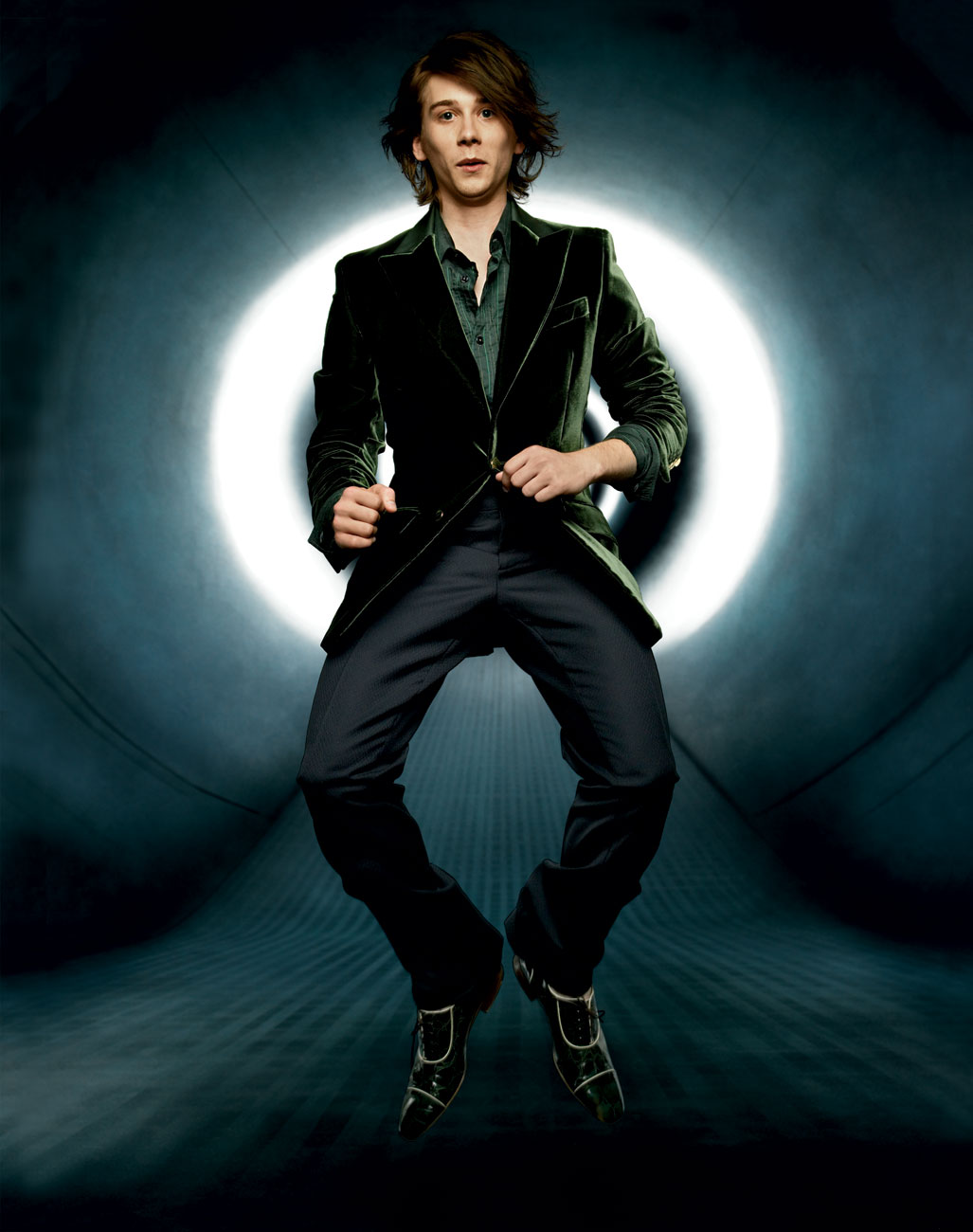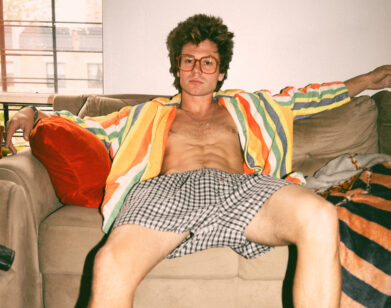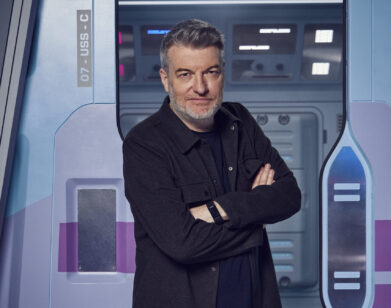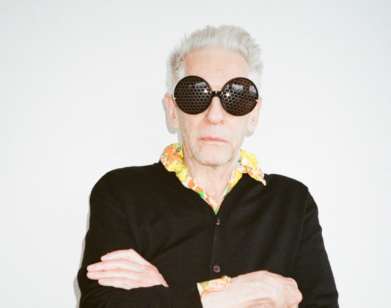Lou Pucci
For someone who’s currently starring in two of the year’s most offbeat and oddly titled indie flicks-The Chumscrubber and Thumbsucker-20-year-old Lou Pucci’s acting career got off to a normal enough start. His parents asked him to give it a shot, and, like the good Catholic boy they raised him to be, he minded them. At the age of 15 Pucci landed a part in the Broadway production of The Sound of Music, but instead of pursuing a career in the floodlights, the young actor took on a memorable role as an abused teen in Rebecca Miller’s Personal Velocity (2002). And though he plays the titular character in Thumbsucker-directed by Mike Mills and co-starring Tilda Swinton, Vince Vaughn, and Keanu Reeves as a New-Age orthodontist-Pucci manages to maintain a fairly normal existence in New Jersey, shunning the indie-kid-on-the-rise lifestyle. Here, he talks to fellow traveler on the edge, Selma Blair.
SELMA BLAIR: Hey, Lou!
LOU PUCCI: Hi, Selma. What’s up?
SB: Well, we’re doing a lot of work at my house right now, and everything’s all in boxes, but I found the TV and took an extension cord and put it in the back yard, and I set up a blanket and watched your movie last night. And I loved it. It was like a private drive-in movie for me and my dog, Wink.
LP: I’ve always wanted to build a drive-in movie theater. I swear to God, I always wanted to make a bowling alley and a drive-in movie theater because they don’t have them anywhere anymore.
SB: I know! They’re incredible. They’re the most romantic, huge, scary-looking things. You drive by them in the daytime, and they’re always abandoned and weird. I’ve actually never been to a drive-in movie. Ever.
LP: Man, you missed something. Don’t worry, I’m gonna build one someday.
SB: You’re gonna have to do really big-budget films and make tons of cash, because that’s a major plot of land you’ll have to buy.
LP: It’ll take a long time, but I don’t have to do huge-budget films to do it.
SB: Well, if you build it . . .
LP: They will come. [both laugh]
SB: I will come at least.
LP: They don’t make as much money because they don’t have as many theaters. That’s their whole problem.
SB: Yeah, I’m sure they’re not cost-efficient at all, which is how everything is made and built these days, it seems. So, everyone would just have to go to one theater.
LP: You don’t have to have just one screen. That’s my point.
SB: But think how much land you’re going to have to buy! You’re going to have to do it in Siberia to make it affordable.
Hopefully that’s the whole point to life-that you have to experience it for yourself, but then when you do you realize that you’ve learned so much from the bad things that sometimes they’re better than the good things.Lou Pucci
LP: That’s not true.
SB: Lou, thank God you’re an actor and a magician instead of a businessman, because I don’t think that things are going to go your way.
LP: Look, you have to find the space. Then you make an octagon of screens, right?
SB: Okay.
LP: And then you have all the people on every piece of the octagon looking at their side of the screen. Radio transmissions are going into each side of the eight screens.
SB: Okay.
LP: You have an eight-screen drive-in movie theater right there. Just off the top of my head.
SB: Okay, but think about the huge plot of land. It’s going to have to be bigger than a crop circle. This is what everyone says about me: I’m always the fly in the ointment. [both laugh] I’m just playing devil’s advocate because I want you to be the angel that rises above. So, Lou, please make the octagon drive-in. I’ll be there. Unfortunately, by the time you can afford that plot of land, no one is going to be able to afford a car to come watch the movies.
LP: That’s what you think.
SB: [laughs] Please prove me wrong.
LP: I’m gonna win this one. I’m going to give you a drive-in movie theater.
SB: [laughs] Look how close we’ve become already.
LP: I know.
SB: Well, the first thing that struck me watching your movie last night was when your character’s mom, played by the lovely Tilda Swinton, was writing about her most distinctive feature. It was a thread that stayed with me through the whole film: What are our most distinctive features? So, I was wondering what you think your most distinctive feature is.
LP: Man, I got no idea. Maybe it’s like at the end of the film, when my character learns that there is no such thing as a “most distinctive feature”-that you shouldn’t care about how or why people are judging you. Because if you’re doing that, you’re just going to lie to people by trying to make them feel happy or feel better about looking at you. You should really just tell them the truth, no matter what the hell your distinctive feature is.
SB: Right. Well, you do such a wonderful job capturing the awkwardness of that stage of growing up. You captured a certain sensitivity. It was really poetic and clear.
LP: That’s just so Mike Mills. He has the power to make it so coherent.
SB: Was it easy acting out his words?
LP: It was so easy it was ridiculous. Because all he did was let you trust him, and he trusted you. The only thing you have to do is let the director keep you on a path, and if you have that you almost can’t go wrong.
SB: Isn’t that the best way to work?
LP: Yeah, and that’s why I was so freakin’ spoiled in that movie, are you kidding? [Blair laughs] That’s what Tilda said to me, “You’re so spoiled.” And I was like, “Oh, man, that sucks.” But then she said, “No, it’s good, because if you’re spoiled then that’s the level that you’re going to want to be on in any work situation.” I always have to acknowledge that this is what was good and this is how I felt, and if I’m not feeling that way then there’s something wrong.
SB: You’re a lucky man. I felt that way when I worked on Todd Solondz’s Storytelling [2002]; it was so hard to work after that. He had such a vision for what he wanted, so it made it easy for me to say, “Okay, I’m going to let the spirit move through me in the way he wants, but in a way that’s truthful to me.”
LP: Exactly. It’s like a family. I felt as though I were getting approval from my parents by doing it, but with Mike Mills as the parent. We had such a friendship-we’ve given each other something amazing, and we’re each saying it’s for the other person, but really it’s for both of us.
SB: That’s really lovely, and that seems like the perfect working situation.
LP: I hope that happens again.
SB: I’m sure it will if that’s your intention, and then the ones that don’t happen that way will be a lesson to learn from, too.
LP: Absolutely. That’s what the movie’s about. My character has these painful and horrible experiences, but he learns so much from them. Hopefully that’s the whole point to life-that you have to experience it for yourself, but then when you do you realize that you’ve learned so much from the bad things that sometimes they’re better than the good things.
SB: I wish I could have been a little more like you at your age. I’m only starting to realize all this stuff now. [both laugh] In fact, right before I called you I was reading this book about how to deal with life in a lighter way. It talks about the expectations of the people around us and how sometimes-it’s so funny because it’s exactly what you were saying when I asked you about your most distinctive feature-if we try to live up to people’s expectations, we’re going to be submerging our naturalness and constructing layers of false images, and we’re going to be really uncomfortable.
LP: Yeah, that’s the way I see it.
SB: It’s exactly what I was reading before we started talking.
LP: That’s odd.
SB: It’s so weird how-
LP: Everything connects completely.
SB: I don’t want to sound too out there and spiritual . . .
LP: No. I hope I don’t either. But I talk about religion all the time because it’s amazing to realize that there’s this connection and that the more knowledge you get the happier you can be, because you’re okay with everything. It’s like the difference between being smart and being wise.
SB: I think there’s a lot to be said for spirituality. I don’t want to get into this whole theological thing, so I’ll stop right here.
LP: No, that’s okay.
SB: Well, I just think it’s strange when people say, “There is no God.” Because I feel so connected to people and things that I just can’t deny that there’s a God who wants us to tell good stories and be the best we can be and forgive and be forgiven, even if we’re not the best we can be. I really believe innately that we do the best we can.
LP: We may have created this projection of what God should be, as this judge or test, but the fact is, the only way we know about God is by knowing ourselves in some way. So God must be in ourselves-you can’t deny that. If you say that God is somewhere else, which is what a lot of religions say, I just can’t deal with it. I guess it’s the difference between Buddhism, Christianity, and Judaism, or something.
SB: Yeah, I don’t think God or spirituality should be seen as something off-putting.
LP: Well, if you know yourself, you can look at the world and see it clearly, and you can see that there’s God in everything. I don’t know. Maybe I’m out of my mind.
SB: No, it’s all with good intentions, and it also reminds me of the movie-when your character has gone through his past and at the end he’s running and he’s free, it’s like he’s finally breathing his own air. Another thing that amazed me was when your character takes Ritalin and stays up all night reading Moby Dick. And in the morning he goes, “I changed, I changed.” It’s a wonderfully innocent thing, your character wanting it to be that easy.
LP: I’ll tell you, I really didn’t know that was going on while I was acting. I cannot take credit for that. That’s the hardest thing to take, the fact that I wasn’t conscious of it, because it means that I didn’t really make that movie.
SB: No, you did. I think that for an actor that’s the point. Like you said earlier, you’re put on a path, and you let the director guide you, and that’s when things can get the most real when you’re not conscious of what you’re doing. You’re being that character. It’s great to watch when somebody loses himself and isn’t self-conscious about it.
LP: Exactly. That’s the actor’s role.
SB: All right, Lou. It was great talking to you, and as the coach of the debate team says in the movie, “Line ’em up and knock ’em down.”







